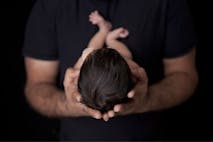
Northern Ireland man charged with murder of woman and her preborn child
Bridget Sielicki
·
New study adds to body of research showing negative effects of abortion on women
Support After Abortion, an online organization devoted to helping people impacted by abortion find hope and healing, recently published the results of a study it commissioned, which was conducted by the group Shapard Research. The study surveyed 114 women who obtained chemical abortions (commonly referred to as “medication abortions”) about their experiences.
The study found that 34% of women suffered from negative self-image following their chemical abortions. And while a large percentage felt they could have benefitted from some form of counseling or other support following their abortions, 82% of women did not know where to look for help.
Live Action recently launched Can’t Stay Silent, a website dedicated to post-abortive individuals. It contains a report which has compiled research similar to the study released by Support After Abortion, as well as personal testimonies. Although the sample size in the Support After Abortion study is small, other similar studies cited by Can’t Stay Silent substantiate some of its findings.
READ: Post-abortion trauma is real, and researchers do women no favors by denying it
For example, feelings of low self-esteem or negative self-image can be a sign of depression. Research compiled in the Can’t Stay Silent report shows that depression can be quite common in post-abortive women. A cohort study of data for nearly 2,000 women taken from the National Longitudinal Survey of Youth found that, eight years after the fact, women whose first pregnancies ended in abortion were 65% more likely to score in the high-risk range for clinical depression than women whose first pregnancies resulted in birth. One meta-analysis of 30 independent studies found a 45.5% prevalence of depression and bipolar disorder among post-abortive women generally.
Post-abortive women’s personal testimonies frequently speak of feelings of negative self-image, as well. Carol wrote:
The self-loathing brought me to a world of darkness. A world where love was an obsolete word and hate was the name of the game. I deserved punishment and found someone to help me in this goal. My self worth had deteriorated. I gained weight, stopped wearing make-up and did not care what I wore. My husband abused me and I deserved his abuse.
Similarly, Joyce wrote, “As time went on after the abortion I experienced low self-esteem, shame, guilt, low self worth, and [I] didn’t love and care about myself.”
And Christine wrote, “I spent a lot of time trying to push the events of that day out of my mind. I suffered from nightmares and a spiraling self image. I wanted my baby and couldn’t have her. I was worthless….”
When asked “What method would you most likely use to find after-loss care if you found yourself in need of such help?” the most popular response (24.6%) in the Support After Abortion survey was “websites online.” Another 13.2% said they would seek help from someone they knew had experienced the same or a similar loss.
Websites like Can’t Stay Silent aim to address these needs by providing a wealth of online information about the experience of abortion and its after-effects; links to organizations, including Support After Abortion, which are dedicated to providing after-care; as well as sharing the personal stories of individuals who have experienced abortion.

Live Action News is pro-life news and commentary from a pro-life perspective.
Contact editor@liveaction.org for questions, corrections, or if you are seeking permission to reprint any Live Action News content.
Guest Articles: To submit a guest article to Live Action News, email editor@liveaction.org with an attached Word document of 800-1000 words. Please also attach any photos relevant to your submission if applicable. If your submission is accepted for publication, you will be notified within three weeks. Guest articles are not compensated (see our Open License Agreement). Thank you for your interest in Live Action News!

Bridget Sielicki
·
Politics
Cassy Cooke
·
Analysis
Cassy Cooke
·
Analysis
Nancy Flanders
·
Newsbreak
Angeline Tan
·
Human Interest
Nancy Flanders
·
International
Bettina di Fiore
·
Human Rights
Bettina di Fiore
·
Politics
Bettina di Fiore
·
Human Interest
Bettina di Fiore
·
Activism
Bettina di Fiore
·